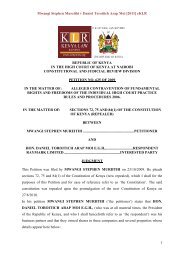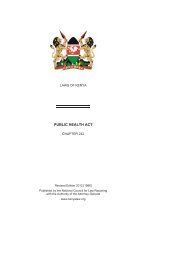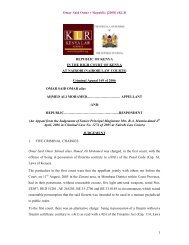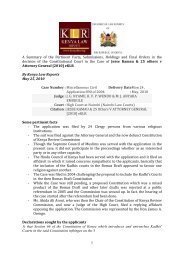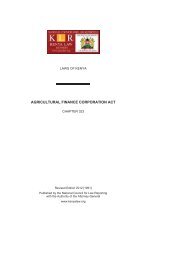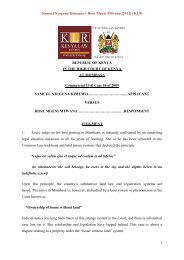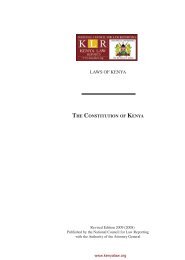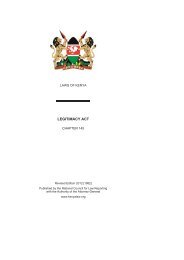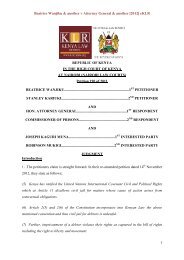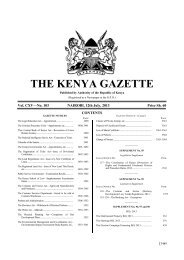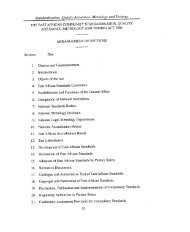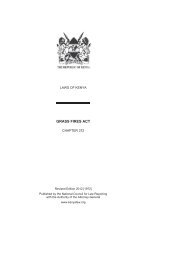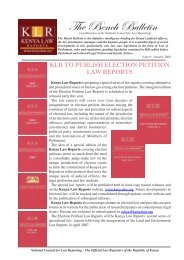Download the Full Judicial Opinion - Kenya Law Reports
Download the Full Judicial Opinion - Kenya Law Reports
Download the Full Judicial Opinion - Kenya Law Reports
Create successful ePaper yourself
Turn your PDF publications into a flip-book with our unique Google optimized e-Paper software.
Peter Wambugu Kariuki & 16 o<strong>the</strong>r v <strong>Kenya</strong> Agricultural Research Institute[2013] eKLRa) A declaration that <strong>the</strong> respondent violated <strong>the</strong> petitioners’ rights to fairlabour practices, fair remuneration and reasonable working conditions.b) A declaration that <strong>the</strong> petitioners were permanent employees of <strong>the</strong>respondent and <strong>the</strong> termination of <strong>the</strong>ir employment was unfair and unlawful.c) A declaration that each of <strong>the</strong> petitioners is entitled to terminal benefits,namely: 90 days notice for years worked, accumulated leave pay for <strong>the</strong>years served, unpaid overtime, house allowance, compensation for loss ofemployment and service for <strong>the</strong> years worked.d) An order compelling <strong>the</strong> respondent to pay <strong>the</strong> petitioners terminalbenefits due to <strong>the</strong>m in accordance with <strong>the</strong> provisions of <strong>the</strong> EmploymentAct, 2007.e) An order for costs of <strong>the</strong> Petition.f) Such o<strong>the</strong>r orders as <strong>the</strong> honorable court may deem fit to grant.The respondent is <strong>the</strong> <strong>Kenya</strong> Agricultural Research Institute. It is a publicinstitution established to conduct agricultural research for public good under<strong>the</strong> Ministry of Agriculture and is established under <strong>the</strong> Science andTechnology Act, Chapter 250 of <strong>the</strong> <strong>Law</strong>s of <strong>Kenya</strong>. It opposed <strong>the</strong> petition byfiling on 18.07.2012 <strong>the</strong> replying affidavit sworn by its Lanet Centre’sAdministrative Officer one Paul Marutegek. The respondent was initiallyrepresented by Pauline Masila Advocate and later changed representationto Millimo, Muthomi & Company Advocates.2
Peter Wambugu Kariuki & 16 o<strong>the</strong>r v <strong>Kenya</strong> Agricultural Research Institute[2013] eKLRThe petition came up for hearing on 25.04.2013. Mr. Konosi Advocateappeared for <strong>the</strong> petitioners while Mr. Millimo Advocate appeared for <strong>the</strong>respondent.For <strong>the</strong> petitioners, it was stated as follows:a) The petitioners were employed by <strong>the</strong> respondent as casual workers toserve in various capacities and on diverse dates being 13.09.1985, 1.06.1977,5.12.1984, 15.08.1986, 17.07.1985, in 1991, 7.03. 2000, 30.10.2006, in 2002 and2007, 2.01.2008, 2.12.2009, in 2008, 5.08.2009, 1999 and 5.01.1990. The initialemployment was on casual terms for a term of two or three months and uponlapsing of <strong>the</strong> term each of <strong>the</strong> respondents continued to serve inemployment of <strong>the</strong> respondent without any interruption. The petitioners weremembers of <strong>the</strong> National Social Security Fund as permanent staff of <strong>the</strong>respondent as relevant contributions to <strong>the</strong> Fund were made on <strong>the</strong>ir behalf.b) In <strong>the</strong> course of <strong>the</strong> accruing permanent service, <strong>the</strong> respondent required<strong>the</strong> petitioners to convert <strong>the</strong>ir permanent service to casual service bydemanding that <strong>the</strong>y sign letters titled employment on casual terms ofservice. The letters of casual employment were issued to <strong>the</strong> petitioners ondiverse dates and <strong>the</strong>y are attached on <strong>the</strong> supporting affidavit of PeterWambugu Kariuki. Each of <strong>the</strong> letters specified <strong>the</strong> duties of <strong>the</strong> affectedpetitioner and that <strong>the</strong> casual employment would be subject to <strong>the</strong> followingconditions, namely:i. That it will be for unspecified period not exceeding three months effectivefrom <strong>the</strong> commencement date as stated in <strong>the</strong> letter.ii. That <strong>the</strong> wages would be determined as per a daily rate set out in <strong>the</strong>letter.3
Peter Wambugu Kariuki & 16 o<strong>the</strong>r v <strong>Kenya</strong> Agricultural Research Institute[2013] eKLRd)About September, 2010 after periods of non-payment, <strong>the</strong> respondentoffered to pay <strong>the</strong> petitioners part of <strong>the</strong>ir unpaid salaries as full and finalpayment up to <strong>the</strong> date of <strong>the</strong> payment and upon acknowledging <strong>the</strong>payment <strong>the</strong> respondent would offer <strong>the</strong> petitioners <strong>the</strong> contract ofconversion from permanent employment to casual employment. Since <strong>the</strong>petitioners considered <strong>the</strong>mselves as permanent employees <strong>the</strong>y decided todecline and to reject <strong>the</strong> conversion contracts. It was <strong>the</strong> petitioners’ casethat such unilateral variation of <strong>the</strong>ir terms of service was a gross violation of<strong>the</strong>ir constitutional rights.e) The respondent had involved Administration Police Officers to force <strong>the</strong>petitioners to sign and accept <strong>the</strong> conversion contracts or to get evictedfrom <strong>the</strong> housing provided by <strong>the</strong> respondent. Subsequently <strong>the</strong> respondentlocked out <strong>the</strong> petitioners from 1.10.2010 and <strong>the</strong> <strong>Kenya</strong> Plantation andAgricultural Union filed on 26.10.2010 Industrial Cause No. 1303 of 2010 atNairobi on behalf of <strong>the</strong> petitioners. The award in that cause as delivered on17.05.2011 by <strong>the</strong> Honourable Justice James Rika and <strong>the</strong> members of <strong>the</strong>court (<strong>the</strong>n a tribunal) is <strong>the</strong> last appendix on <strong>the</strong> supporting affidavitaccompanying <strong>the</strong> petition. In that case <strong>the</strong> claimant argued <strong>the</strong> case on<strong>the</strong> basis of <strong>the</strong> facts as set out in this judgment and argued that <strong>the</strong> newcontracts were prejudicial to <strong>the</strong> employees. The court was asked to order anend to <strong>the</strong> lockout, <strong>the</strong> employees to be protected from signing <strong>the</strong>conversion contracts which were detrimental to <strong>the</strong>m, old contracts beterminated before negotiating <strong>the</strong> new contracts, all wages and outstandingallowances be paid and <strong>the</strong> threatened eviction be declared unlawful. Inthat cause <strong>the</strong> respondent urged <strong>the</strong> court to reject <strong>the</strong> prayers and touphold <strong>the</strong> counterclaim by ordering <strong>the</strong> grievants to pay <strong>the</strong> respondentarrears of rent and to be ordered to surrender vacant possession of <strong>the</strong>institutional houses. In deciding <strong>the</strong> case, <strong>the</strong> court found that <strong>the</strong>re was no5
Peter Wambugu Kariuki & 16 o<strong>the</strong>r v <strong>Kenya</strong> Agricultural Research Institute[2013] eKLRseeking declarations and <strong>the</strong> same should be dismissed. In suchcircumstances <strong>the</strong> court lacks jurisdiction and <strong>the</strong> respondent’s case is that<strong>the</strong> petition must fail. It was submitted that litigation must come to an end as<strong>the</strong> court was being invited to review its own decision.The respondent fur<strong>the</strong>r submitted that in 2010 <strong>the</strong> petitioners did not declineto sign <strong>the</strong> renewal contracts because <strong>the</strong>y were already permanent staff but<strong>the</strong>y did so by <strong>the</strong>ir own volition as an election and as shown by <strong>the</strong> award incause No. 1303 of 2010. It was submitted for <strong>the</strong> respondent that PWK1 on <strong>the</strong>supporting affidavit showed that <strong>the</strong>re was interrupted service.The following are <strong>the</strong> issues to be determined in this petition:1. Whe<strong>the</strong>r <strong>the</strong> doctrine of res judicata or abuse of <strong>the</strong> process of <strong>the</strong> courtapply in <strong>the</strong> circumstances of this case.2. Whe<strong>the</strong>r <strong>the</strong> petitioners’ rights were breached as alleged.3. Whe<strong>the</strong>r <strong>the</strong> petitioners are entitled to <strong>the</strong> remedies as prayed for in <strong>the</strong>petition.On <strong>the</strong> first issue it was submitted for <strong>the</strong> petitioners that cause No. 1303 of2010 was about nonpayment of wages, unlawful lockout and wrongfuleviction of employees and <strong>the</strong> claims were totally different from <strong>the</strong> claims in<strong>the</strong> present petition. Fur<strong>the</strong>r it was submitted that <strong>the</strong> Industrial Court <strong>the</strong>nestablished as a tribunal lacked jurisdiction to enforce fundamental rights andit cannot be said that <strong>the</strong> petitioners would have enforced <strong>the</strong>ir rights asclaimed in this petition before <strong>the</strong> Industrial Court Tribunal as <strong>the</strong>n established.Thus, it was submitted that <strong>the</strong> petitioners had filed this petition in <strong>the</strong> HighCourt and later transferred to <strong>the</strong> Industrial Court as established in <strong>the</strong>7
Peter Wambugu Kariuki & 16 o<strong>the</strong>r v <strong>Kenya</strong> Agricultural Research Institute[2013] eKLRConstitution of <strong>Kenya</strong>, 2010 and <strong>the</strong> Industrial Court Act, 2011 as a court ofrecord to determine disputes and enforce employment and labour rights asprayed for by <strong>the</strong> petitioners.To urge a finding of res judicata and in alternative dismissal of <strong>the</strong> petition onaccount of abuse of court process, <strong>the</strong> respondent cited some authorities.First was <strong>the</strong> decision by <strong>the</strong> High Court in David Kamau – Versus – Savings &Loan <strong>Kenya</strong> Limited.[1] The Honorable court upheld a preliminary objectionand struck out <strong>the</strong> suit because it was an abuse of court process despite <strong>the</strong>finding that <strong>the</strong> plea of res judicata did not apply because <strong>the</strong> previous suit inissue had not been fully heard and determined. The learned Judge at <strong>the</strong> lastpage of <strong>the</strong> ruling stated as follows:“In my considered view, a comparison of <strong>the</strong> above pleadings shows that <strong>the</strong>Plaintiff‟s claim in <strong>the</strong> current suit bears a striking resemblance to <strong>the</strong> previoussuit. The matter directly and substantially in issue is basically <strong>the</strong> same.Notwithstanding <strong>the</strong> few cosmetic changes which make <strong>the</strong> current suitappear to be based on subsequent events, <strong>the</strong> substratum of both suits is <strong>the</strong>exercise of <strong>the</strong> Defendant‟s statutory power of sale and <strong>the</strong> Plaintiff‟s attemptsto determine how that power should be exercised. Moreover <strong>the</strong> issue ofaccounts and statutory notice (which are being introduced in <strong>the</strong> present suit)are issues which could well have been raised in <strong>the</strong> previous suit.The Plaintiff is <strong>the</strong>refore in breach of Order VII rule 1 (2) of <strong>the</strong> Civil ProcedureRules in failing to disclose <strong>the</strong> existence of <strong>the</strong> previous suit. I find that <strong>the</strong>present case is an abuse of <strong>the</strong> process of <strong>the</strong> court as is intended tocircumvent <strong>the</strong> ruling of Azangalala J in High Court Civil Suit No. 1566 of 1999and that of <strong>the</strong> Court of Appeal in Civil Application No. Nai. 255 of 2005dismissing <strong>the</strong> Plaintiff‟s application for injunction pending <strong>the</strong> hearing of itsintended appeal against <strong>the</strong> ruling of Azangalala J in HCCC No. 1566 of 1999.8
Peter Wambugu Kariuki & 16 o<strong>the</strong>r v <strong>Kenya</strong> Agricultural Research Institute[2013] eKLROn this ground I do uphold <strong>the</strong> preliminary objection and strike out <strong>the</strong>Plaintiff‟s suit as being an abuse of <strong>the</strong> process of <strong>the</strong> court,”Secondly, <strong>the</strong> respondent referred to <strong>the</strong> case of Maingi Munyoki –Versus-Rebecca Cieranja.[2] The court held that it was an abuse of court process tore-litigate <strong>the</strong> same issue or a judge of concurrent jurisdiction to sit on appealagainst a decision made by such o<strong>the</strong>r judge of concurrent jurisdiction.[3]Thirdly <strong>the</strong> respondent’s counsel referred to <strong>the</strong> High Court decision in GuledHousing Company Limited –Versus- Dekee Holdings Limited.[4] The court wasof <strong>the</strong> view that whe<strong>the</strong>r a matter is res judicata was a matter of substanceand is not how <strong>the</strong> orders of a judge are couched but what was decided by<strong>the</strong> court and whe<strong>the</strong>r <strong>the</strong> court conclusively decided <strong>the</strong> matter before it.The issue of res judicata is not merely of form but of substance.The court has considered <strong>the</strong> authorities and has also considered its decisionin Meshack Ageng‟o Omondi –Versus- Eldoret Municipal Council andAno<strong>the</strong>r,[5] in which <strong>the</strong> court stated:“Res-Judicata is an affirmative defense barring <strong>the</strong> same parties fromlitigating a second law suit on <strong>the</strong> same claim or any o<strong>the</strong>r claim arising from<strong>the</strong> same transaction or series of transactions and that could have been, butwas not raised in <strong>the</strong> first suit (See Black‟s <strong>Law</strong> Dictionary, 9 th Edition). The threeessential elements are:(a) an earlier decision on <strong>the</strong> issue;(b) a final judgment on <strong>the</strong> merits; and(c) <strong>the</strong> involvement of <strong>the</strong> same parties, or parties in privity with <strong>the</strong> originalparties.9
Peter Wambugu Kariuki & 16 o<strong>the</strong>r v <strong>Kenya</strong> Agricultural Research Institute[2013] eKLRThe doctrine of res-Judicata aims at ensuring that litigation comes to anend. An issue that has been conclusively decided upon by a competentjudicial authority must not find itself before <strong>the</strong> same or o<strong>the</strong>r competentjudicial authority for reconsideration.”The court has to evaluate <strong>the</strong> circumstance of <strong>the</strong> current petition in view of<strong>the</strong> cited decisions and determine whe<strong>the</strong>r <strong>the</strong> petition is res judicata or anabuse of <strong>the</strong> process of <strong>the</strong> court or it is not barred on such considerations.Industrial cause No. 1303 was filed on 26.10.2010, was heard and closed on21.03.2011 and <strong>the</strong> ensuing award was made on 17.05.2011. The cause washeard and concluded by <strong>the</strong> Industrial Court <strong>the</strong>n established andconstituted as a tribunal and not as a superior court of record as provided forin Article 162(2) (a) as read toge<strong>the</strong>r with Article 165(5) (b) of <strong>the</strong> Constitutionof <strong>Kenya</strong>, 2010 which came into effect on 27.08.2010. Indeed, <strong>the</strong> award wassigned by <strong>the</strong> Honourable learned Judge and two members as it obtained in<strong>the</strong> statutory provisions that applied to <strong>the</strong> <strong>the</strong>n court established as atribunal. The Industrial Court as a superior Court of record was establishedunder <strong>the</strong> Industrial Court Act, 2011 which came into operation on 30.08.2011,long after conclusion of cause No. 1303 of 2010 by <strong>the</strong> award deliveredon17.05.2011. On <strong>the</strong> o<strong>the</strong>r hand, this petition was filed on 13.07.2012 at atime <strong>the</strong> Industrial Court as a superior court of record had not beenappointed and had not become operational.Thus, it is <strong>the</strong> opinion of <strong>the</strong> court that <strong>the</strong> petitioners who set out to enforcealleged breaches of <strong>the</strong>ir fundamental rights were entitled to move <strong>the</strong> HighCourt and subsequently <strong>the</strong> petition was correctly transferred to this court as<strong>the</strong> constitutional and statutory forum for enforcement of <strong>the</strong> rights andfreedoms as <strong>the</strong>y arise and relate to employment and labour relations. It is <strong>the</strong>considered opinion of this court that <strong>the</strong> court sitting as a tribunal in cause No.10
Peter Wambugu Kariuki & 16 o<strong>the</strong>r v <strong>Kenya</strong> Agricultural Research Institute[2013] eKLR1303 of 2010 was not vested with <strong>the</strong> primary statutory or constitutionaljurisdiction to enforce fundamental rights and freedoms.The court fur<strong>the</strong>r considers that <strong>the</strong> issue of fundamental rights and freedomsas pleaded in <strong>the</strong> petition was not a mere clothing of fashion and form tocircumvent <strong>the</strong> decision in cause No. 1303 of 2010. Far from form and merefashion, it was a substantive constitutionally protected matter that goes tojurisdiction and which <strong>the</strong> petitioners could only ventilate before <strong>the</strong> superiorcourt of record and not <strong>the</strong> tribunal that had decided that cause. It was anissue never raised before <strong>the</strong> tribunal, could be so raised collaterally butwithout finality of its determination and even if it had been so raised anddecided upon by <strong>the</strong> tribunal, that would not operate as a bar to <strong>the</strong>petitioners seeking a determination on <strong>the</strong> issue before <strong>the</strong> constitutionallyprescribed forum namely, <strong>the</strong> superior court of record. Taking into account<strong>the</strong> doctrine of justiciability which answers <strong>the</strong> question as to <strong>the</strong> best andcorrect forum to entertain and determine <strong>the</strong> dispute at hand, it is <strong>the</strong>considered opinion and holding of <strong>the</strong> court that enforcement offundamental rights and freedoms in disputes relating to employment andlabour relations is properly vested in this court by <strong>the</strong> Constitution and <strong>the</strong>Industrial Court Act, 2011 as a superior court of record.While making this finding, <strong>the</strong> court recognizes <strong>the</strong> constitutional obligationimposed, by Article 10 of <strong>the</strong> Constitution, upon all state organs, state officers,public officers and all persons to uphold <strong>the</strong> national values and principleswhenever applying or interpreting <strong>the</strong> Constitution; enacting, applying orinterpreting any law; or making or implementing public policy decisions. Theprovision is an embodiment of <strong>the</strong> idea of taking <strong>the</strong> constitution to <strong>the</strong>people which <strong>the</strong> preamble to <strong>the</strong> Constitution recognizes as <strong>the</strong> aspirationsof all <strong>Kenya</strong>ns for a government based on <strong>the</strong> essential values of humanrights, equality, freedom, democracy, social justice and <strong>the</strong> rule of law.11
Peter Wambugu Kariuki & 16 o<strong>the</strong>r v <strong>Kenya</strong> Agricultural Research Institute[2013] eKLRAccordingly, each and every individual person has <strong>the</strong> constitutionalobligation to uphold <strong>the</strong> national values and principles as prescribed in <strong>the</strong>Article. The court considers that obligation as a necessary and mandatoryprescription towards <strong>the</strong> realization of <strong>the</strong> provisions of <strong>the</strong> Constitution butwhich does not override <strong>the</strong> constitutional authority of <strong>the</strong> superior courts as<strong>the</strong> primary and authoritative forum for enforcement of <strong>the</strong> fundamentalrights and freedoms in accordance with <strong>the</strong> Constitutional and enablingstatutory provisions.Accordingly, with respect to <strong>the</strong> first issue for determination, <strong>the</strong> court findsthat <strong>the</strong> petition is not barred on account of res judicata or abuse of <strong>the</strong>process of <strong>the</strong> court.The second issue for determination is whe<strong>the</strong>r <strong>the</strong> petitioners’ rights werebreached as alleged. The petitioners cited Articles 22, 23, 28 and 41 of <strong>the</strong>Constitution of <strong>Kenya</strong>, 2010, Article 23 of <strong>the</strong> Universal Declaration on HumanRights and Article 15 of <strong>the</strong> African Charter on Human and Peoples’ Rights.However, during <strong>the</strong> submissions counsel for <strong>the</strong> petitioners narrowed down toArticle 41(1) of <strong>the</strong> Constitution which provides that every person has a rightto fair labour practices.What is this right to fair labour practices?First, it is <strong>the</strong> opinion of <strong>the</strong> court that <strong>the</strong> bundle of elements of “fair labourpractices” is elaborated in Article 41(2), (3), (4) and (5) of <strong>the</strong> Constitution.Under Article 41(2) every worker has <strong>the</strong> right to fair remuneration; toreasonable working conditions; to form, join or participate in <strong>the</strong> activities andprogrammes of a trade union; and to go on strike. Under Article 41(3) everyemployer has <strong>the</strong> right to form and join an employers’ organization; and toparticipate in <strong>the</strong> activities and programmes of an employers’ organization.12
Peter Wambugu Kariuki & 16 o<strong>the</strong>r v <strong>Kenya</strong> Agricultural Research Institute[2013] eKLRUnder Article 41(4), every trade union and every employers’ organization has<strong>the</strong> right to determine its own administration, programmes and activities; toorganize; and to form and join a federation. Under Article 41(5) every tradeunion, employers’ organization and employer has <strong>the</strong> right to engage incollective bargaining. These constitutional provisions constitute <strong>the</strong>foundational contents of <strong>the</strong> right to fair labour practices.Secondly, it is <strong>the</strong> opinion of <strong>the</strong> court that <strong>the</strong> right to “fair labour practices”encompasses <strong>the</strong> constitutional and statutory provisions and <strong>the</strong> establishedwork place conventions or usages that give effect to <strong>the</strong> elaborations set outin Article 41 or promote and protect fairness at work. These include provisionsfor basic fair treatment of employees, procedures for collectiverepresentation at work, and of late, policies that enhance family life whilemaking it easier for men, women and persons with disabilities to go to work.Thirdly, it is vital to appreciate <strong>the</strong> antagonistic challenges this court and o<strong>the</strong>rrelevant institutions are likely to face towards <strong>the</strong> realization of <strong>the</strong> right to fairlabour practices. These challenges manifest as difficult policy considerationsthat inform decision making in determining disputes relating to fairness inemployment and labour relations and prescribing appropriate remedies. Inthat regard, two dilemmas have emerged for which it is not easy to envision<strong>the</strong> evolution of employment and labour relations and <strong>the</strong> role of <strong>the</strong> law inthat evolution. The dilemmas have been expressed in <strong>the</strong> following terms:“….These are first whe<strong>the</strong>r to promote collective labour relations founded oneffective bargaining which can only be based on strong trade unions, orwhe<strong>the</strong>r to encourage <strong>the</strong> progressive dilution of „bargaining‟ in favour of <strong>the</strong>more ambiguous „information and consultation standards‟….The seconddilemma is to determine <strong>the</strong> extent to which it is legitimate to qualifymanagement prerogatives, which some employers would like to exercisesubject to little or no restriction, by individual employment rights.”[6]13
Peter Wambugu Kariuki & 16 o<strong>the</strong>r v <strong>Kenya</strong> Agricultural Research Institute[2013] eKLRIn our constitutional and statutory framework on employment and labourrelations, a mixed prescription with regard to <strong>the</strong> identified dilemmas hasbeen provided for and it is <strong>the</strong> opinion of <strong>the</strong> court that in resolving disputesabout <strong>the</strong> right to fair labour practices, every individual case shall beconsidered and determined on its unique merits. Admittedly, <strong>the</strong>se dilemmashave continued to confront this court in <strong>the</strong> many cases that come before<strong>the</strong> court and hopefully a coherent approach based on <strong>the</strong> nature of <strong>the</strong>cases presented will evolve or emerge.In this petition it was submitted that <strong>the</strong> petitioners had served for a longperiod of time without any break in service and <strong>the</strong>reby bringing to an end<strong>the</strong>ir casual employment status. Fur<strong>the</strong>r, <strong>the</strong> accrued period of unbrokenservice <strong>the</strong>reby entitled and emplaced <strong>the</strong>m to a permanent employmentstatus. To cement <strong>the</strong>ir case <strong>the</strong> petitioners submitted that <strong>the</strong>ir continuousservice beyond three months converted <strong>the</strong>m from casual service topermanent terms of employment with full benefit of <strong>the</strong> minimum terms andconditions of service under <strong>the</strong> Employment Act, 2007.For <strong>the</strong> respondent it was submitted that sometimes in September, 2010 <strong>the</strong>petitioners had indicated that <strong>the</strong>y did not wish to remain in employment of<strong>the</strong> respondent and <strong>the</strong>y declined to sign <strong>the</strong> new contracts of service. Therespondent paid <strong>the</strong> full wages up to 30.09.2010 being <strong>the</strong> last day <strong>the</strong>y hadserved and <strong>the</strong>reby bringing to an end <strong>the</strong> employment contract without anyliabilities.A casual employee is defined under section 2 of <strong>the</strong> Employment Act, 2007 tomean a person <strong>the</strong> terms of whose engagement provide for his payment at<strong>the</strong> end of each day and who is not engaged for a longer period thantwenty four hours at a time. The court has considered <strong>the</strong> material on recordand finds that <strong>the</strong> petitioners were not casual workers because <strong>the</strong>y were14
Peter Wambugu Kariuki & 16 o<strong>the</strong>r v <strong>Kenya</strong> Agricultural Research Institute[2013] eKLR<strong>the</strong> employee leaves employment by reason of <strong>the</strong> employer‟s breach of his,her or its obligation.”[7]The court finds that <strong>the</strong> opinion applies to this petition because <strong>the</strong>respondent breached <strong>the</strong> high trust, confidence and cooperation implied inevery contract of employment when <strong>the</strong> respondent deliberately refused toacknowledge <strong>the</strong> long term of service by <strong>the</strong> petitioners and declined toresolve <strong>the</strong> genuine grievances surrounding <strong>the</strong> signing of <strong>the</strong> contract forconversion to casual service. The court finds that by conduct of <strong>the</strong>respondent, <strong>the</strong> petitioners’ contracts of service were terminatedconstructively.In view of <strong>the</strong> findings of <strong>the</strong> court on <strong>the</strong> first and second issues, <strong>the</strong> courtfinds that <strong>the</strong> petitioners are entitled to <strong>the</strong> remedies as prayed for with <strong>the</strong>modification that <strong>the</strong> wages were agreed upon at all material times; in viewof <strong>the</strong> circumstances of <strong>the</strong> case, payment of wages for one month in lieu oftermination would be reasonable; and payment of six months gross salaries at<strong>the</strong> rate of <strong>the</strong> salary at termination for <strong>the</strong> unfair constructive termination isfair - especially that <strong>the</strong> petitioners were in short term contracts but for <strong>the</strong>conduct of <strong>the</strong> respondent that led to crystallizing of <strong>the</strong> long termpermanent employment. The court finds that <strong>the</strong>re was no material evidenceon record to support <strong>the</strong> o<strong>the</strong>r compensatory reliefs in <strong>the</strong> prayers made in<strong>the</strong> petition and <strong>the</strong> same were <strong>the</strong>refore not tenable. A claim for gratuity orservice pay is not justified because <strong>the</strong> material on record show that <strong>the</strong>petitioners were members of <strong>the</strong> National Social Security Fund and <strong>the</strong>relevant remission was made by <strong>the</strong> respondent.Finally, <strong>the</strong> court is alert that <strong>the</strong> respondent is a public body and is bound by<strong>the</strong> established standards for employment in <strong>the</strong> public service. This court17
Peter Wambugu Kariuki & 16 o<strong>the</strong>r v <strong>Kenya</strong> Agricultural Research Institute[2013] eKLRidentified <strong>the</strong> applicable standards in <strong>the</strong> case of Robert Mureithi Ndegwa –Versus- <strong>the</strong> Minister for Tourism where it was stated as follows:“The fourth question is: What are <strong>the</strong> constitutional and statutory standards forappointment of <strong>the</strong> Board‟s chief executive officer? It was submitted for <strong>the</strong>respondent that renewal of <strong>the</strong> petitioner‟s contract of service wouldcontravene Section 37 of <strong>the</strong> Tourism Act, 2012 and Articles 10 prescribingdemocracy and participation of <strong>the</strong> people, 73 on responsibilities ofleadership, 75 on conduct of public officers and 77 on restriction on activitiesof state officers. The court has considered <strong>the</strong>se provisions and is of <strong>the</strong>opinion that <strong>the</strong> main issue for determination is whe<strong>the</strong>r <strong>the</strong> renewal of <strong>the</strong>contract would undermine or derogate from any constitutional or statutoryprovisions governing recruitment, appointment, promotion or retention inpublic service. Article 232 of <strong>the</strong> Constitution provides for <strong>the</strong> values andprinciples of public service to include:a) high standards of professional ethics;b) efficient, effective and economic use of resources;c) responsive, prompt, effective, impartial and equitable provision of services;d) involvement of <strong>the</strong> people in <strong>the</strong> process of policy making;e) accountability for administrative acts;f) transparency and provision to <strong>the</strong> public of timely, accurate information;g) subject to paragraph (h) and (i), fair competition and merit as <strong>the</strong> basis ofappointments and promotions;18
Peter Wambugu Kariuki & 16 o<strong>the</strong>r v <strong>Kenya</strong> Agricultural Research Institute[2013] eKLRd) An order for <strong>the</strong> respondent to pay <strong>the</strong> costs of <strong>the</strong> Petition.e) The respondent to deliver to each of <strong>the</strong> petitioners a certificate of servicewithin thirty days from <strong>the</strong> date of this judgment.Signed, dated and delivered in courtat Nakuru this Friday, 3 rd May, 2013.BYRAM ONGAYAJUDGE[1] Ruling delivered by Honourable Justice H.M.Okwengu on 14.03.2007 in CivilCase No. 112 of 2007, High Court at Nairobi, Commercial and Tax Division.[2] Ruling delivered on 3.12.2009 by Honourable Justice Mary Kasango inHCCC No. 64 of 1986 at Meru.[3] See last page of <strong>the</strong> Ruling[4] Ruling delivered on 20.01.2012 by Honourable Justices Mumbi Ngugi andD.S Majanja in High Court Civil Appeal No. 381 of 2011at paragraph 20.[5] Ruling delivered on 12.10.2012 by Honourable Justice Byram Ongaya inIndustrial Court Cause No. 15N of 2010 at Nairobi at page 5-6 of court copy.[6] See Richard Painter & Ann Holmes, Cases and Materials on Employment<strong>Law</strong>, Oxford University Press, (2002) 4 th Edition at page 9.[7] Judgment in cause No. 13 of 2012 at Nakuru formerly cause No. 610 of2012 at Nairobi delivered on 03.05.2012 by Honorable Justice Byram Ongaya.[8] See paragraph 20 of <strong>the</strong> Judgment in Industrial Court Petition No. 41 of2012 at Nairobi delivered on 16.11.2012 by <strong>the</strong> Honourable Justice ByramOngaya.21



